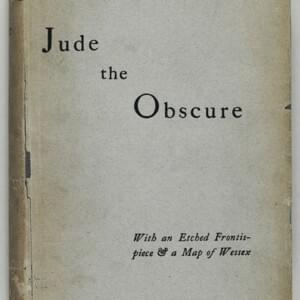
Jude the Obscure (Chap. 5.7) Thomas Hardy
На этой странице вы найдете полный текст песни "Jude the Obscure (Chap. 5.7)" от Thomas Hardy. Lyrxo предлагает вам самый полный и точный текст этой композиции без лишних отвлекающих факторов. Узнайте все куплеты и припев, чтобы лучше понять любимую песню и насладиться ею в полной мере. Идеально для фанатов и всех, кто ценит качественную музыку.

From that week Jude Fawley and Sue walked no more in the town of Aldbrickham.
Whither they had gone nobody knew, chiefly because nobody cared to know. Any one sufficiently curious to trace the steps of such an obscure pair might have discovered without great trouble that they had taken advantage of his adaptive craftsmanship to enter on a shifting, almost nomadic, life, which was not without its pleasantness for a time.
Wherever Jude heard of free-stone work to be done, thither he went, choosing by preference places remote from his old haunts and Sue's. He laboured at a job, long or briefly, till it was finished; and then moved on.
Two whole years and a half passed thus. Sometimes he might have been found shaping the mullions of a country mansion, sometimes setting the parapet of a town-hall, sometimes ashlaring an hotel at Sandbourne, sometimes a museum at Casterbridge, sometimes as far down as Exonbury, sometimes at Stoke-Barehills. Later still he was at Kennetbridge, a thriving town not more than a dozen miles south of Marygreen, this being his nearest approach to the village where he was known; for he had a sensitive dread of being questioned as to his life and fortunes by those who had been acquainted with him during his ardent young manhood of study and promise, and his brief and unhappy married life at that time.
At some of these places he would be detained for months, at others only a few weeks. His curious and sudden antipathy to ecclesiastical work, both episcopal and noncomformist, which had risen in him when suffering under a smarting sense of misconception, remained with him in cold blood, less from any fear of renewed censure than from an ultra-conscientiousness which would not allow him to seek a living out of those who would disapprove of his ways; also, too, from a sense of inconsistency between his former dogmas and his present practice, hardly a shred of the beliefs with which he had first gone up to Christminster now remaining with him. He was mentally approaching the position which Sue had occupied when he first met her.
On a Saturday evening in May, nearly three years after Arabella's recognition of Sue and himself at the agricultural show, some of those who there encountered each other met again.
It was the spring fair at Kennetbridge, and, though this ancient trade-meeting had much dwindled from its dimensions of former times, the long straight street of the borough presented a lively scene about midday. At this hour a light trap, among other vehicles, was driven into the town by the north road, and up to the door of a temperance inn. There alighted two women, one the driver, an ordinary country person, the other a finely built figure in the deep mourning of a widow. Her sombre suit, of pronounced cut, caused her to appear a little out of place in the medley and bustle of a provincial fair.
"I will just find out where it is, Anny," said the widow-lady to her companion, when the horse and cart had been taken by a man who came forward: "and then I'll come back, and meet you here; and we'll go in and have something to eat and drink. I begin to feel quite a sinking."
"With all my heart," said the other. "Though I would sooner have put up at the Chequers or The Jack. You can't get much at these temperance houses."
"Now, don't you give way to gluttonous desires, my child," said the woman in weeds reprovingly. "This is the proper place. Very well: we'll meet in half an hour, unless you come with me to find out where the site of the new chapel is?"
"I don't care to. You can tell me."
The companions then went their several ways, the one in crape walking firmly along with a mien of disconnection from her miscellaneous surroundings. Making inquiries she came to a hoarding, within which were excavations denoting the foundations of a building; and on the boards without one or two large posters announcing that the foundation-stone of the chapel about to be erected would be laid that afternoon at three o'clock by a London preacher of great popularity among his body.
Having ascertained thus much the immensely weeded widow retraced her steps, and gave herself leisure to observe the movements of the fair. By and by her attention was arrested by a little stall of cakes and ginger-breads, standing between the more pretentious erections of trestles and canvas. It was covered with an immaculate cloth, and tended by a young woman apparently unused to the business, she being accompanied by a boy with an octogenarian face, who assisted her.
Комментарии (0)
Минимальная длина комментария — 50 символов.












